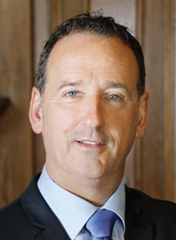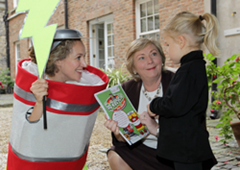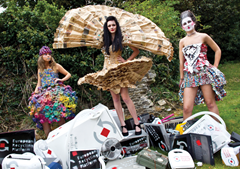ERP Ireland: New resources for recovery
 The recast Waste Electrical and Electronic Equipment (WEEE) Directive and the current review of the producer responsibility initiatives (PRIs) model will present the Irish waste recovery market with new opportunities, says ERP Ireland CEO Martin Tobin.
The recast Waste Electrical and Electronic Equipment (WEEE) Directive and the current review of the producer responsibility initiatives (PRIs) model will present the Irish waste recovery market with new opportunities, says ERP Ireland CEO Martin Tobin.
There’s an old saying at the European Recycling Platform (ERP) that there’s no such thing as waste, only wasted resources. Right now, ERP is working to make sure current waste reforms don’t become wasted opportunities. The recast of the WEEE Directive (which came into force on 24 July 2012 and which Ireland has until 14 February 2014 to transpose) and the Government’s PRI review present exciting new outlets for Ireland to increase resource recovery. ERP has been preparing and will be prepared for these opportunities.
ERP has grown steadily across Europe since its establishment in 2002. It now runs 26 compliance schemes (in WEEE and waste battery recycling) in 13 countries, as well as packaging compliance schemes in two countries.
This pan-European experience and market intelligence was of invaluable benefit when ERP Ireland was established in 2005. Our ongoing interaction with our European partners has helped us build a highly successful WEEE compliance scheme here. Today, ERP collects and recycles on behalf of more than 2,300 members across Europe, treating approximately 400,000 tonnes of WEEE per year.
Recast WEEE Directive
Under the original Directive a target of 4kg of WEEE per person each year exists. Ireland has consistently surpassed this. Last year, despite the recession, collection stood at approximately 8kg per person. Positive engagement with stakeholders has been invaluable, but the most vital component has been the public. Without the commitment of ordinary people to return EEE, Ireland’s proud record would have been impossible.
Public commitment is something we never take for granted, and communicating the importance of disposing WEEE (and batteries) responsibly is ongoing. The quicker discarded EEE is presented for recycling, passed over to approved operators like ERP, the quicker materials can be recovered. Recovery means retrieving valuable materials. This reduces the environmental impact and the need to mine materials.
Electrical and electronic appliances also contain hazardous materials. Returning old appliances to authorised outlets gives certainty that these materials will be treated properly.
At home and across Europe, however, the Directive hasn’t secured the desired level of recycling. A lot of material still goes into the wrong hands. A 2009 ERP analysis of the current WEEE market concluded that approximately 70 per cent of WEEE goes to unauthorised channels. More ambitious targets were needed. The last few years have seen a spike in metal theft both here and across Europe, which has added to the problem of WEEE ‘leakage’.
The new Directive addresses current deficiencies. Four years after the Directive comes into force, a new target of 45 per cent of the average weight of WEEE placed in a national market will take effect. This will increase to 65 per cent three years later. The Directive also provides for collection of very small WEEE (no more than 25cm) at retail shops (or in the immediate proximity) with sales areas relating to EEE of at least 400 square metres, free to end users.
ERP welcomes the new Directive, in particular the new articles on preventing WEEE ‘leakage’ to informal or non-authorised channels such as rogue scrap dealers. It also welcomes the new rules on the standardisation of registers across member states, for which ERP is well placed.
At ERP we’ve been preparing for transposition of the recast Directive for the past six months. New legislation is expected to make producers responsible for business-to-business waste (as well as business-to-consumer waste). We are engaging with producers and businesses to make sure that they understand the changes.
ERP will work with the Department of the Environment, Community and Local Government and others in advance of new regulations, offering constructive proposals.
In June, the Minister for the Environment Phil Hogan announced a review of the PRI model. The model covers initiatives such as WEEE, batteries, packaging, end-of-life vehicles (ELVs), tyres and farm plastics. We welcome the review and have been involved in intense and constructive engagement with the consultants conducting it. The outcome will be positive, ERP believes, and it welcomes acknowledgement already given that the compliance sector needs to be more competitive and transparent.
Ireland’s WEEE collection market is always evolving, presenting new opportunities. At present, we’re working on the digital TV switchover’s impact, which has seen over 200,000 non-compliant TVs effectively become obsolete since 24 October 2012. ERP has been communicating a message to the public that TVs shouldn’t be sent to landfill or kept in the attic, but rather sent to authorised collection points such as designated retailers and civic amenity sites.
Changes in waste regulations policy will be a major focus for ERP over the next few years, but our members will remain paramount. We fulfil WEEE collection and treatment obligations for producers through a lean, cost-effective model, combining the benefits of our pan-European experience and an open and transparent approach.
Battery recycling: all charged up
The Batteries Directive came into effect in Ireland in September 2008. Customers can deposit used batteries with retailers that sell equivalent products (no purchase necessary) or their local civic amenity centre. And it’s all free of charge.
 Using its WEEE experience, ERP has constantly engaged in creating public awareness, all the more important as batteries are easy to store and to forget about recycling. Batteries have hazardous substances, which makes recycling essential. Between 2009 and 2011, 29 per cent of portable batteries sold here were collected, exceeding the target of 25 per cent.
Using its WEEE experience, ERP has constantly engaged in creating public awareness, all the more important as batteries are easy to store and to forget about recycling. Batteries have hazardous substances, which makes recycling essential. Between 2009 and 2011, 29 per cent of portable batteries sold here were collected, exceeding the target of 25 per cent.
Awareness remains key, and we’ve rolled out a number of campaigns to get the message across particularly to children and the wider public. ERP’s education programmes to pre-schools, primary, second and third level institutions are designed to raise awareness of the importance of recycling to protect our environment and educate students on how and where to responsibly recycle. We are also very appreciative of the important role that teachers play in disseminating this important message.
We are currently preparing to launch our ‘Christmas Appeal’. This year, ERP has asked a special someone to help families recycle their batteries. Santa will be travelling around Ireland to meet all the local children who recycle batteries in his grotto at various events organised over the coming weeks in association with numerous county councils. It is estimated that 32 million batteries (800 tonnes) will be purchased between now and Christmas, accounting for almost 40 per cent of all batteries sold in the country each year. While it’s impossible to guarantee a white Christmas, this year we want to make it a green one!
 For more information please contact:
For more information please contact:
Martin Tobin, CEO
Tel: +353 1 299 5642
Web: www.erp-recycling.ie






